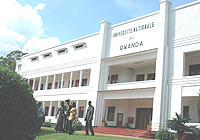Many medical students seem bored and dissatisfied with their experience in medical school and consider the years as a difficult and irrelevant hurdle that has to be crossed to become a doctor. The Faculty of Medicine at the National University of Rwanda has been undergoing changes so as to improve the quality of its products; ‘doctors’.


Many medical students seem bored and dissatisfied with their experience in medical school and consider the years as a difficult and irrelevant hurdle that has to be crossed to become a doctor.
The Faculty of Medicine at the National University of Rwanda has been undergoing changes so as to improve the quality of its products; ‘doctors’.
One of the key areas that have been pointed out is the clinical experience of its student’s right from the start of the course as it is done in the other East African countries.
Previously, the medical school had been embarking on the basic science education especially in the first preclinical years. Sciences such as anatomy, physiology, and Histology have basic clinical importance for a student to learn.
Students benefit a lot through these subjects if learnt with good practical approach. But basic sciences such as Physics, chemistry and mathematics especially taught in these first years could be wastage of time to some extent.
Lecturers from various faculties have previously exposed students to all the information that they feel is essential from their respective discipline and then test them at the end of the course to see if they are able to regurgitate a sufficient amount of that information in an oral or written test.
Students will forget most of what you have asked them to memorize and will not be able to apply what they can recall in practice.
This is not only educational malpractice, it is tragically inefficient when you consider how much energy faculty put into teaching and students put into studying during these preclinical years to result in such a small yield.
The problem with this method of learning is that there is too much emphasis on memorization of facts by students for their own sake, and they seem to readily forget what they were taught later in their clinical years.
If the major concern as a teacher is only that student do well on written tests of recognition and recall, the educational approach just described will accomplish the mission.
But if, become independent, reason their way through patient problems, recall and apply what they have been taught in medical school to the care of their patients,
Education medical school should always embark on the problems based learning that enable students to acquire new information and skills as they need it, and as medical research moves ahead, keeping contemporary in their knowledge and skills.
Important is to have problem based learning by considering the goals of undergraduate medical education, the challenge patient problems present, the nature of the physician’s clinical reasoning process, how that process is associated with knowledge needed to are for patients, and the importance of self-directed learning for an effective career in medicine.
External pressure to rid the curriculum of the need to provide comprehensive coverage of the content in all disciplines basic to medicine and to make the first two years of medical school more relevant to the practice of medicine come from medical school deans.
The East African medical schools adopt a different system that train students to learn how to research and get the right information on their own but get tested to what is expected at a standard level. This makes a difference when it comes to the quality of product produced at the end.
Professor Dr Herbert Nsanze, Dean of Faculty-medicine has worked hard to put all these things right. The current teaching curriculum at the medical school has been adjusted to the medical education mechanism applied within East African medical schools.
While all these changes cannot be enforced at the same time, Professor Nsanze will need time to make all these necessary changes. These changes need gradual process for them to yield fruitful results at the right time.
The Ministry of Education should re-examine its science curriculum especially at the high school level. Students need to get enough practical in biology, chemistry and physics in their high school education as it is done in East Africa. This experience builds a good foundation for students.
Ends


